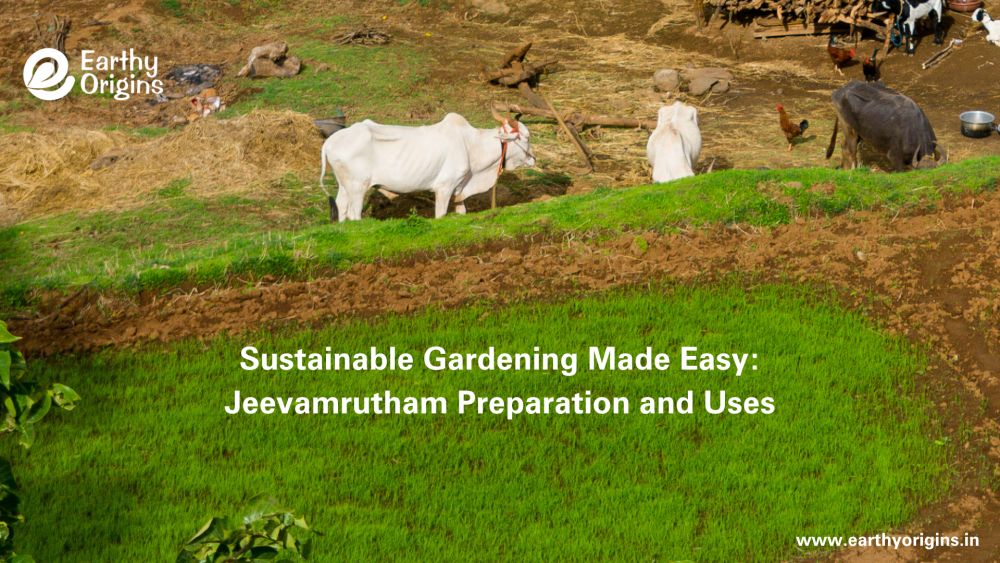Sustainable Gardening Made Easy: Jeevamrutham Preparation and Uses
In our pursuit of sustainable and organic farming solutions, Jeevamrutham stands out as a light of hope. The extraordinary benefits of this traditional bio-fertilizer, which has its roots in ancient Indian agricultural traditions, are generating renewed interest in the gardening community. If you want to improve the health of your garden naturally, you must first learn the preparation, ingredients, uses, and benefits of the same. Let us delve into the interesting realm of this method and see how it can transform your attitude to gardening and farming.
What is Jeevamrutham?
Jeevamrutham, which translates as "life nectar," is a fermented bio-inoculant rich in beneficial bacteria. These microscopic warriors perform their magical work in the soil, encouraging robust plant development and a flourishing ecology. Made from natural materials, it is a powerful bio-fertilizer and soil enhancer. It nourishes the soil with advantageous microorganisms, acting as a microbial inoculant to encourage healthy plant growth. This traditional concoction is praised for its capacity to improve soil fertility, promote plant immunity, and increase crop yields without the negative impacts of chemical fertilizers.
Jeevamrutham Ingredients: A Simple Recipe for Success.
Jeevamrutham's simplicity is what gives it its beauty. All you need are a few easily obtained ingredients:
Desi Cow Dung: This is the highlight of the show. The dung from native cows is better since it has more microorganisms in it.
Desi Cow Urine: Do not underestimate this item! The hormones, enzymes, and minerals included in cow urine naturally promote the growth of plants.
Jaggery: This raw sugar provides the good bacteria with nourishment, which initiates the fermentation process.
Besan Flour (Gram Flour): This provides nitrogen, another essential nutrient for good plant growth.
Soil: Beneficial bacteria that are already adapted to your local conditions are introduced by a little amount of good soil from your garden.
Preparation: A Step-by-Step Guide.
To make a batch of this magical concoction, follow these steps:
1. Prepare the ingredients: 10 liters of water, 500 gm desi cow dung, 300 ml desi cow pee, 100 gm jaggery, 50 gm besan flour, and a handful of soil from your garden.
2. Mix it Up: Combine all the materials except the soil in a big nonmetallic container (such as a plastic bucket). To dissolve the besan flour and jaggery, give it a good stir.
3. Permit it Ferment: Place a loose lid or piece of cloth over the jar and set it in a cool spot. Give it a full day or two to ferment, depending on the weather. When the mixture smells nice and somewhat sour and foams a little, it's ready.
4.The Last Step: Use a sieve to extract any bigger particles from the fermenting mixture. To the filtered liquid, add a handful of soil and well stir.
You can now use your Jeevamrutham!
For both farmers and gardeners, this preparation is a great option because it is cost-effective as well as sustainable.
Benefits of Jeevamrutham
So, how does this magical potion assist your plants? Its superpowers are broken down as follows:
Enhances Soil Health: To promote soil aeration, break down organic matter, and increase plant nutrient availability, It introduces helpful bacteria.
Improves Plant Growth: The increased microbial activity encourages root development, resulting in stronger and healthier plants.
Improves agricultural Yield: Studies have shown that employing this can greatly boost agricultural yields when compared to conventional approaches.
Enhances Pest Resistance: Having a diverse microbial community in healthy soil makes it more resistant to diseases and pests.
Decreases Dependency on Chemical Fertilizers: This is a naturally occurring supply of nutrients, thus there's less need for potentially hazardous chemicals.
Jeevamrutham Applications: How to Use This Plant's Superpower
There are two main applications for Jeevamrutham:
Application of Soil: Apply the prepared mixture straight to the soil surrounding the base of your plants after diluting it with three to five parts water. The soil should be slightly wet but not drenched. When growing, use this every 7–10 days.
Spray for Foliar Area: This can be diluted with ten parts water and sprayed on your plants' leaves as a foliar spray for an instant boost. Don't spray while it's the warmest of the day.
Seed Treatment: To improve seed germination rates and the health of your seedlings, soak your seeds in it before planting.
A Sustainable Approach for Your Garden
Jeevamrutham provides a sustainable and environmentally friendly substitute in a world where chemical-laden fertilizers are used more and more. It is good for the environment and your plants, low maintenance, and simple to make. So, instead of using harsh chemicals, embrace the power of nature with this ancient Indian knowledge.
When compared to traditional chemical treatments, studies have indicated that crops treated with this approach can show yield increases of 15-20%.
By using this technique, farmers can reduce their fertilizer expenses by up to 50%. This technique improves soil organic carbon levels over time, which is essential for soil fertility in the long run.
Conclusion
Jeevamrutham is more than simply a mystical potion; it's an invitation to nurture your garden with nature's power. With a few simple items and minimal work, you can provide a plethora of benefits to your plants. Imagine seeing increased growth, colorful blossoms, and insect resistance—all brought about by this easy, long-lasting technique. So why not try Jeevamrutham? It could be the missing piece of information your garden has been waiting for. Begin small, see the benefits, and go on a road to a healthy, chemical-free oasis for your plants.









